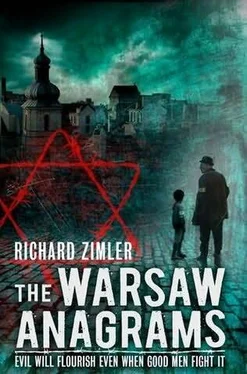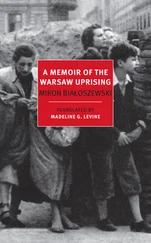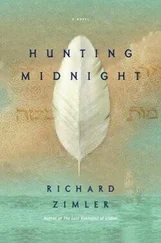‘I’m from the Reich Census Bureau,’ I told him, ‘and this man is helping me.’
He looked at my swastika armband on the ground and frowned. ‘I know who you are, so shut up and put up your hands!’
We did as he said, but Izzy gave me a sideways look, as if he was about to pull the cord of some mad plan.
‘Not yet!’ I whispered to him in Polish; I thought I could still talk my way out of this.
‘Shut your snout!’ the German yelled.
Below my frantic heartbeat, I heard the metallic scratch of another stake landing in the woman’s pile. She was still gardening – it might have been comic under other circumstances.
‘Stay still!’ the Nazi ordered Izzy. ‘And you, get on your knees!’ he told me.
‘If you let us get on our way,’ I told him, ‘I’ll give you five hundred złoty.’
‘If you want a bullet in your head, keep talking!’ he growled.
I thought he was going to search me for the pistol that the jeweller must have warned him about, but when I was kneeling he jabbed the muzzle of his gun into my ear. Panic surged through me from my legs up to the top of my head. My bladder opened, and in a trembling voice, I said, ‘You’re too young to want my death on your conscience.’
‘I told you to shut up!’ he shouted. ‘And don’t move!’
‘You!’ he snarled, turning to Izzy, ‘throw down your gun! And do it slowly.’
Out of the corner of my eye I could see Izzy lifting it out.
‘That’s it… Toss it near my feet.’
The pistol landed by the German and made a little hop. It’s over for us now , I thought.
Behind us, a window squealed open. I closed my eyes, and a deep silence opened around me. I imagined I was falling into it, and I wanted to keep falling – for each second to stretch towards the infinite. Who wouldn’t want more time?
‘You!’ the Gestapo man called to the woman behind us. ‘Get over here!’
I opened my eyes to find the Nazi sneering at her. ‘Who gave you permission to dig up this courtyard?’ he demanded.
I realized that boys holding guns were brutalizing women all over Europe.
She made no reply. She clutched her thoughts deep inside her – as though they were children she’d never give up to an enemy.
‘Do you speak a little German?’ the young man demanded of her.
‘ Ja ,’ she replied indifferently, wiping her runny nose.
He licked his lips. ‘Go to Jawicki Jewellers on Spacerowa Street. You understand?’ When she nodded, he added, ‘Tell the Gestapo officer there to come right here. And don’t dawdle. If he’s not here in two minutes, I’ll put a bullet in your friend’s head!’
She took two steps, then swivelled around with quiet grace. Standing at the centre of a world over which no man had any power, she opened her eyes wide enough to hold all her fury and raised her spade.
The German was staring down at me. He’d already forgotten about her.
In the second before she swung, she drew her lips back over her chipped brown teeth. I’ll never forget her look of spiteful hate; the transformation seemed worthy of a devil in a painting by Bruegel. Then I heard her sharp intake of breath. So did the Gestapo officer. Turning, he caught the blow on the side of his face. With a guttural scream, he fell to one knee. His cap landed several feet away, on a patch of muddy ice. Clamping his hand over his battered and bloody ear, he pointed his gun at her, but before he could pull the trigger, she clouted him again, grunting. It seemed an act of vengeance against years of mistreatment. His nose and cheekbone shattered. I’d never heard bone breaking before, but the crack was unmistakable. An explosion of blood splattered over my face and on to my coat. I wiped the spray off my cheeks as the German fell forward on to his belly, his hands splayed out, his fingers arched like a crab’s legs. His breaths came in desperate gulps. While trying to raise himself, he groaned. He spoke in a low grumble, as well. I made out the word unrecht – wrong.
Did it seem wrong to him that an illiterate Polish woman hadn’t followed his orders?
I stood up. The German’s right hand had curled around his gun. I stepped down hard on it, and the crunch of his fingers was the sound of the new identity I was making for myself. Shrieking, he collapsed forward. ‘God, no!’ he shouted.
Bending down, I took the pistol. I pointed it at his head. I expected him to look at me, but he pressed himself down into the ground. His lips moved. Maybe he was praying to the earth – or to whatever god he hoped was watching.
We’ll never know if I’d have fired; carefully, patiently, as though all of nature were on her side and nothing could go wrong, the woman put one foot on each side of the Nazi’s legs. I knew what she was about to do, but I didn’t stop her. Instead, I took a step back to give her room.
Regret for that comes to me only infrequently, and only when I think of his parents.
It isn’t that hard to murder a man. A silently enraged Polish woman taught me that.
And yet it must have seemed impossible to the German. How could he meet death in a rusted curve of Slavic iron, five hundred miles from home?
The brutality of her strike made Izzy gasp, then reach for me.
She opened a gash so deep in the Nazi’s forehead that I saw a white flash of bone before blood flooded the wound. His life sluiced down his cheek and spilled on to the earth. With a gurgling sound, he tilted to his side and his jaw fell open.
Heniek, what do you suppose young men think of when they know that they will never again see their home, and the fifty years of future they’d counted on is gone?
What could I have done differently…?
Ask my parents to forgive me for dying young…
No, I don’t know either. I went to my death already an old man. The expectations are different.
The youth’s head sagged. His eyes were open but saw nothing.
The woman was alone in the world with Izzy and me. We three shared the fractured skull of a young man whose name we would never learn. With our eyes, we passed the finality of his death between ourselves like a crust of hard bread.
Izzy picked up his gun.
It was the puddle of blood spreading beneath the young German’s head that made me want to run. I imagined the brown icicles that would hang from his chin that evening. I reached into my coat pocket and handed the woman the demitasse spoons I’d stolen from Mrs Sawicki. She took them in her dirt-encrusted hand and nodded her thanks.

‘ Był she grumbled – ‘He looks heavy – I’ll need the wheelbarrow.’ Those were the only words she ever spoke to Izzy and me – the woman who saved our lives.
Izzy had done business for years with Wysocki Jewellers on Elektoralna Street. Though just a small neighbourhood shop, it had the advantage of being on our way home.
To avoid being spotted, we walked a mile east to the banks of the Vistula and made our way north along a tangled path towards the medieval-looking towers of the Poniatowski Bridge. From there, we headed west into the city centre. We went slowly, stopping often, too exhausted and troubled to exchange more than a few words.
It was nearly two hours later when we finally made it to the jewellery shop. Only then did I notice that Izzy no longer had his tweed fabric.
‘I tossed the bag away while we were running,’ he told me, shrugging off his irritation.
Inside the shop was a wiry young man sitting behind a bulky, old-fashioned desk, hunched over a book, lost to the world. Despite the cold, Izzy and I were sweating heavily, and his arthritis had him close to tears.
Читать дальше













